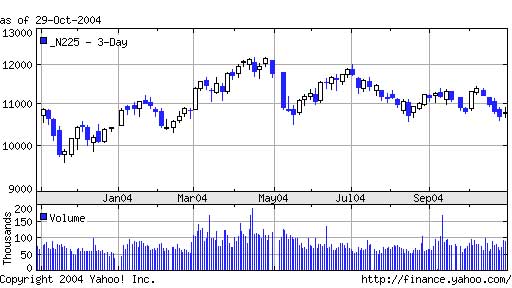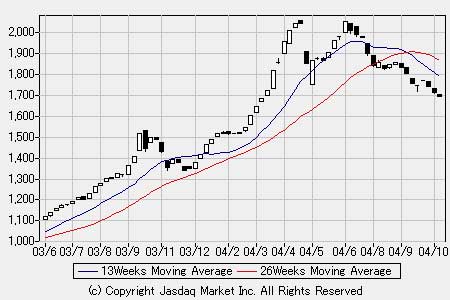| Are Japan's stock exchanges speculative? (The journey to financial freedom - Part 2) |
||
| [posted on November 3, 2004] | ||
|
| Are Japan's stock exchanges speculative? (The journey to financial freedom - Part 2) |
||
| [posted on November 3, 2004] | ||
|
| I got a great shock in October, 2004. When I posted "The journey to financial freedom," my stock strategy had been long-term investment of Yahoo Japan Corporation's (4689 TSE: listed JQ till October 25, 2003: historical price) as core stock. But I took a decision to change my stock strategy by reason of that not only JP:4689's price fell sharply in May and August but it didn't rise in bull market in June and after the announcement of stock splits in September. So I sold off a half of my holdings increased to twice its asset, and bought other promising stocks. And the book of Japan's quarterly corporate report "Kaisha-Shiki-ho" autumn edition was just issued in September. I bought new stocks which they seemed to hit a rock-bottom price at the end of September; however, they have fallen in October and I suffered heavy losses in a short period. During this time, many Japan's stocks sensitively reacted negative news in the market. This phenomenon was often seen during recession period from summer in 2000 to spring in 2003. Moreover Japan's stock investment by foreign investors brought about rising yen since summer in 2003, but this time Japan's stocks had been no effect by rising yen because only depreciation of US dollar brought about it. Bank of Japan said on October 29th "Japan's economy continues to recover" in the Outlook for Economic Activity and Prices; however, according to the research of Japan's Cabinet Office, declining Diffusion Index (DI) of Business Conditions raise questions about the future. (see also Japan Times - Worker confidence down in September) I think many Japan's analysts misestimate Japan's policy to substantial increase taxes by reduced exemption items. Because the abolition of the special spousal exemption will have an impact on taxpayers when they file a final personal income tax return in March in 2005 (many Japan's employees are included in year-end tax adjustment through their office), and they get taxed a residence tax by local government in June in 2005. Many of them will get shocked by tax notice or pay statement after year-end tax adjustment. Moreover relative richer elderly people will do so by the abolition of the exemption for aged person and the reduced deduction public pension in 2005. They are relatively rich, but their shock may be more than the time consumption tax was raised from 3% to 5% in 1997. (see also Ministry of Finance - Tax Policy) When most of them try to undertake a draconian retrenchment, everyone knows downturn in the economy. Unfortunately, the news that employees at a large corporation receive increased bonus may be reported only this year. On March 26, 2003, Benjamin Fulford said "All is not lost in the world's second-largest economy. Despite ongoing problems, there are real signs of hope. And some companies there are actually thriving." in the Forbes article "Japan's Lifesavers." However, one year later, Peter Tasker wrote the article "Those who don't want to recovery Japan's economy" on Newsweek Japan. He said they are Japan's bureaucrats because they have been afraid to drop from notice by growth of emerging companies. I hope his article won't prologue Japan's recession. But there is why Japan's government is bothered about inflation by high stock prices. It's a debt. "I'm bothered about rise in interest rates by inflation." Many Japan's debtors must say so. |
| Nikkei 225 Index (^N225) |
 |
| Nikkei JASDAQ Stock Average |
 |
| By the way, Japan's typical stock indices' charts showed bear market after
double tops with in April and June. (TSE Indices Historical Prices) Basically long-term investment will not always make a profit from now. In short, I trade some rising stocks within a week or two weeks, or only three days as the case may be. Japan's stock investing become like casino games. It means I try to have a game in the short term and run away with the winnings. Of course I show my heels if lose. I decided to take great risks. I sold off my holdings which had unrealized loss, and invested all surplus money in soaring Oricon (4800 Japan's emerging market/Hercules: historical price) in October. I'm certain that Japan's soaring stocks tend to rise about a week after the ex-date. The ex-date is usually four business days before the record date in Japan. So there are limitations of trading for divided new shares in Japan, which cannot be traded about 8 weeks after the ex-date. Hence the demand tends to outreach the supply because circulation of shares temporarily turn into decrease. I don't know these stocks rise only a week after the ex-date, but it may be what is called psychological magic. Unless I miss timing of selling, I would get a big profit. I was planning to sell JP:4800 on November 1th, but I sold out all shares on October 29th as its price began to fall from the peak one. I recovered 60% of loss during October for only four days. I felt it to be casino games. But it is just one of "Game of Life" for me. Say again. Will my plan end in failure? My life never ends by a loss of 2 million yen. Finally, I would like to introduce Japan's stock investing tips provided by stock market journal "Kabushiki Shimbun." Of course I will use it as advice. So let's also visit here! |
![]()
| The journey to financial freedom |
| Capital Gains - Living like Americans in the latter half of the 1990s! |
| Back to the index page of my essays |